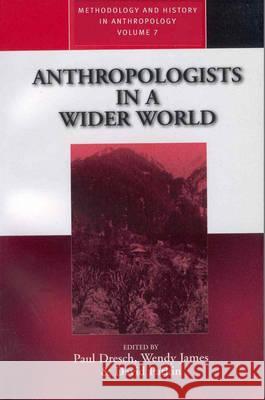Anthropologists in a Wider World: Essays on Field Research » książka
Anthropologists in a Wider World: Essays on Field Research
ISBN-13: 9781571817990 / Angielski / Twarda / 2000 / 288 str.
Anthropologists in a Wider World: Essays on Field Research
ISBN-13: 9781571817990 / Angielski / Twarda / 2000 / 288 str.
(netto: 483,13 VAT: 5%)
Najniższa cena z 30 dni: 498,70
ok. 22 dni roboczych.
Darmowa dostawa!
The tradition of intensive fieldwork by a single anthropologist in one area has been challenged by new emphasis on studying historical patterns, wider regions, and global networks. Some anthropologists have started their careers from the new vantage point, amidst a chorus of claims for innovative methodologies. Others have lived through these changes of perspective and are able to reflect on them, while re-evaluating the place of fieldwork within the broader aims of general anthropology. This book explores these transformations of world view and approach as they have been experienced by anthropological colleagues, a number of whom began their work very much in the earlier tradition. They cover experiences of field research in Africa, Papua New Guinea, South America, Central and South Asia, Europe, the Middle East, Indonesia, Japan and China. Constant through the chapters is a distinctively qualitative empirical approach, once associated with the village but now being developed in relation to large-scale or dispersed communities.
The tradition of intensive fieldwork by a single anthropologist in one area has been challenged by new emphasis on studying historical patterns, wider regions, and global networks. Some anthropologists have started their careers from the new vantage point, amidst a chorus of claims for innovative methodologies. Others have lived through these changes of perspective and are able to reflect on them, while re-evaluating the place of fieldwork within the broader aims of general anthropology. This book explores these transformations of world view and approach as they have been experienced by anthropological colleagues, a number of whom began their work very much in the earlier tradition. They cover experiences of field research in Africa, Papua New Guinea, South America, Central and South Asia, Europe, the Middle East, Indonesia, Japan and China. Constant through the chapters is a distinctively qualitative empirical approach, once associated with the village but now being developed in relation to large-scale or dispersed communities.











